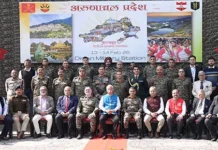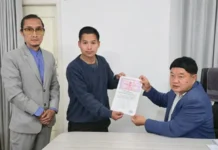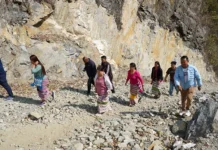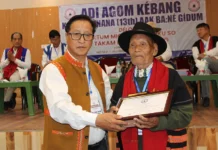Monday Musing
[ Amar Sangno ]
With the announcement of the enhanced dearness allowance (DA), house rent allowance (HRA) and non-practicing allowance (NPA) for all doctors working under the government by Chief Minister Pema Khandu on 22 November, the debate over government doctors practicing in private clinics has been renewed.
Chief Minister Pema Khandu’s government has announced to enhance 4 percent DA, HRA and NPA, from the existing 34 percent to 38 percent, with effect from July 2022, causing annual financial implication of Rs 120 crore. It is believed that more than 68,000 regular government employees will benefit from these enhanced allowances, including the doctors.
NPA is given to doctors working under the central government health centres, railways, or in other departments of the union and the state governments. A medical officer who is not interested in practicing from home can ask for such allowance. The amount of NPA is calculated based on basic pay plus grade pay.
The irony in the health department is that the majority of the government doctors do practice in private clinics whether they avail NPA or not. Many own better healthcare facilities than the government referral centres.
The Arunachal Times has learnt that all doctors, irrespective of their assignment (administration, programme, or general duty), have been availing NPA benefits at the 6th Central Pay Commission rate and at the same time practicing at their respective private clinics.
It has often been alleged that shifting of priority to private clinics by the doctors has been affecting our service delivery system which is aimed to provide optimum level of healthcare service to every person in the state. The doctors allegedly started defying their ideal standard time for OPD from 8 am to 2 pm, leading to overcrowding at various referral centres.
“Why are doctors not available at the OPD till 4 pm like other government staffs at the civil secretariat? Everyone should be subject to uniform rule in terms of working hours,” said an angry patient.
He went on to allege that only a few doctors perform their OPD duty with sheer dedication and sincerity.
“It an open fact that most doctors working under the government have their own clinics, and it is evident that they do pay more heed to their private clinics than the OPD,” he further alleged.
A senior medical officer working in the TRIHMS argued that the NPA being given to them is meagre, and that doctors are compelled to go to private clinics to earn better income. He said that the NPA and the basic salary are way below the basic day-to-day needs.
Isn’t a payback time for the government doctors?
Reportedly, with the enhancement, Chief Minister Khandu’s government is giving an option to every doctor to avail NPA: you either avail it or surrender your NPA to continue private practice.
“There should be a uniform rule for all the government staffs, irrespective of the departments. Why should only doctors be singled out for availing NPA? There are so many government employees who avail other benefits but never bother to work sincerely,” argued a medical officer who was agitated when this was pointed out to him.
It is said that insincerity and lack of dedication among medical officers towards providing clinical care and emergency services have compounded our healthcare system.
Currently, 1:1,082 (allopathic) is the doctor-patient ratio at the national level, and it is 1:2,417 (NHP-2018) in Arunachal.
Medical officers who have better political connection or are influential have never been on clinical and emergency duty. For instance, at the Tomo Riba Institute of Health & Medical Science (TRIHMS), out of 33 GDMOs (state government) only eight GDMOs are doing emergency duties.
“Many GDMOs attached themselves to either non-clinical departments (like blood bank, pathology and immunisation) or became programme officers to get away from emergency duty,” said a medical officer.
“Most of the specialists hardly come to the hospital to manage emergency patients. It’s always done by non-specialised doctors like JR (junior resident), while they (specialists) are busy in their private clinic during odd hours and give ‘telephonic treatment’ in an emergency,” the doctor added.
According to him, this discriminatory approach of the authorities is responsible for the lack of effective healthcare service and overcrowding of patients at various referral centres.
It’s been brought to The Arunachal Times’ knowledge that many specialist doctors – clinical as well as GDMOs – have been assigned as state nodal officers (SNO) and state programme officers (SPO) at the state level, due to which their clinical expertise (surgery, obstetrics & gynaecology, paediatrics, psychiatry, oncology, etc) is not being utilised for needy patients.
It is also believed that due to the excessive number of SNOs and SPOs in the state, there is a shortfall in the service delivery, especially by specialist doctors (clinical) holding SNO posts.
“This is a fact that a good number of doctors are preoccupied with public health programmes, resulting in lack of doctors at the health facilities, particularly specialist care,” said another medical officer on condition of anonymity.
However, Dr Tara Taku, general secretary of the Arunachal Pradesh Doctors’ Association, said: “Doctors in administrative posts are also availing NPA; that’s true. They deserve that. Administrative posts are part of career progression and promotion of doctors who served as clinicians, MOs, SMOs, specialists, etc.”
The chief minister on 28 July this year decided to restructure the health facilities in the state as per the Indian public health standard guidelines, as well as to rationalise the human resource deployment.
Now all eyes are on the Khandu government and Health Minister Alo Libang, as to whether they would be able to correct the fault lines in the health department.




